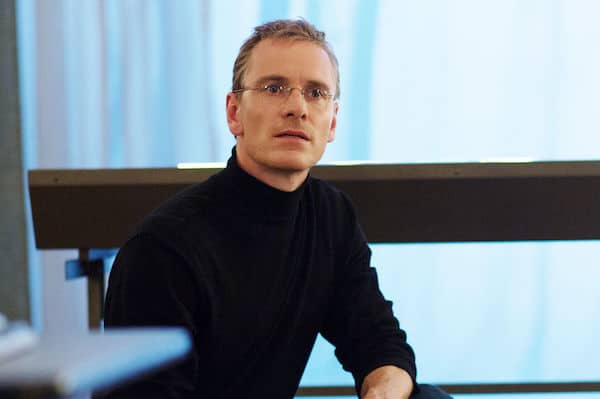The mythology of Steve Jobs knows no bounds. A Zen Buddhist who berated his employees, an absentee father who supported his daughter, and an underdog who spearheaded the biggest company in the world, all through the guise of glasses and a black turtleneck. Was he a good guy? Was he even a genius? Such questions have been asked time and time again, often with an ambiguous response behind them. Judge not by the warmth of the morals, but by the efficiency of the products.

These are the contradictions that drive Steve Jobs, the latest offering from director Danny Boyle and screenwriter Aaron Sorkin. Steeped in five years of heavy research, wordsmith extraordinaire Sorkin (The Social Network [2010], Moneyball [2011]) whittles down Walter Isaacson’s biography to a trio of product launches in 1984, 1988, and 1998 – blending fact and fiction to fit his be-speckled canvas.
Many of the interactions that coat the film’s three-act structure are cobbled together from real events and spun into concise, if occasionally misleading slices of tech history. Consequently, this artistic move has already spoiled its fair share of Apple aficionados. But if fact is what’s desired, then the 2015 doc The Man In The Machine satisfies that taste with pinpoint accuracy. If open to something a little juicier, however, Sorkin’s adaptation is an awe-inspiring sight to behold.
The film hits the ground running in 1984, as Jobs (Michael Fassbender), Joanna Hoffman (Kate Winslet) and Andy Hertzfeld (Michael Stuhlbarg) struggle to get the Apple Macintosh to say “Hello” on it’s home screen. In the midst of a ticking clock and a combative encounter with former girlfriend Chrisann Brennan (Katherine Waterston), Jobs verbally jabs his way through a child he refuses to acknowledge and a weary commander-in-chief (Jeff Daniels) who places side bets on what Bob Dylan quote will be used in the presentation. Talking, talking, and more talking between such riveting actions as fixing a bow-tie, ironing a shirt, or in one impressive display: clicking a computer mouse.
In short, there isn’t much in the way of physical action to spark the senses, leaving Sorkin’s mile-a-minute script all the more impressive as a result. The actors, led by Fassbender’s greatest performance to date, rip through page after page of ripe wordplay; tossing off one-liners and brilliant syllable strings that make most movie scripts seem amateur by comparison. Credit to Winslet, Daniels, and a surprising Seth Rogen, who somehow avoid being buried beneath a mountain of dense dialogue. That the mood of the story can range from hilariously sleek to heartbreakingly sad in the span of a few lines is a testament not only to Sorkin’s blessed penmanship but to Danny Boyle’s fluid direction.

Conveyed through the techno-blues of digital recording, the final act swaps out flash for sincerity. Jobs’ reconciliation is alarming given the smug salesman that power-walked through the previous acts, but Sorkin knows exactly when and where to nudge his colossal character. In a life as sprawling as Jobs, being able to narrow focus to something as relatable as a daughter asking a father why he didn’t accept her is crucial. The answer? At long last, a simple “I’m poorly made.” Pundits will scold Sorkin and Boyle for making Lisa the “Rosebud” to Jobs’ Citizen Kane (1941), but the results are so impactful, the comparison is well deserved.
DVD Features
Ever the perfectionists, both Boyle and Sorkin offer their colorful outlook through audio commentaries that illustrate the rigor of getting the film made. Paired with a three-part documentary that furthers appreciation for Steve Jobs’ immaculate craft, this release is anything but poorly made.
WHERE TO WATCH: (powered by JustWatch)

| Producer: | Guymon Casady, Christian Colson, Danny Boyle, Mark Gordon, and Scott Rudin |
| Release Date: | February 16, 2016 (DVD) |
| Starring: | Michael Fassbender, Kate Winslet, Jeff Daniels, Seth Rogen, Michael Stuhlbarg, and Katherine Waterston |
| User Rating: | |
| Writer: | Aaron Sorkin |
| MPAA Rating: | R |
| Director: | Danny Boyle |
| Distributor: | Universal Pictures |
| External Info: | Official Site |
